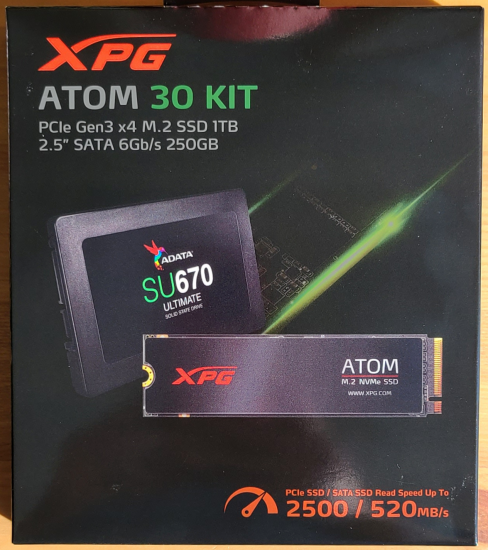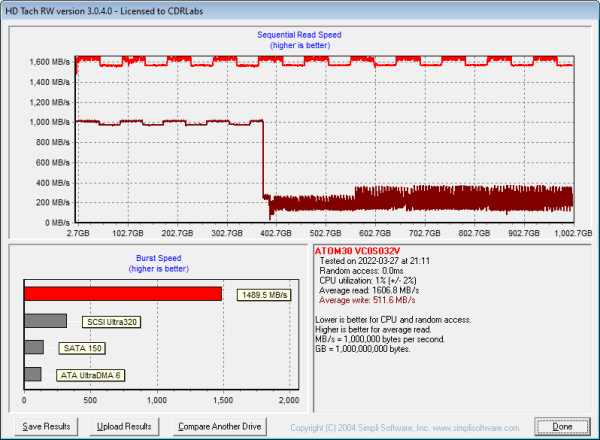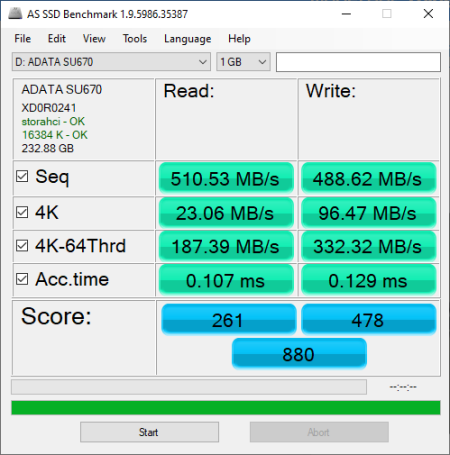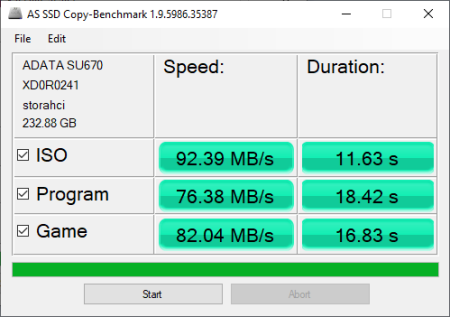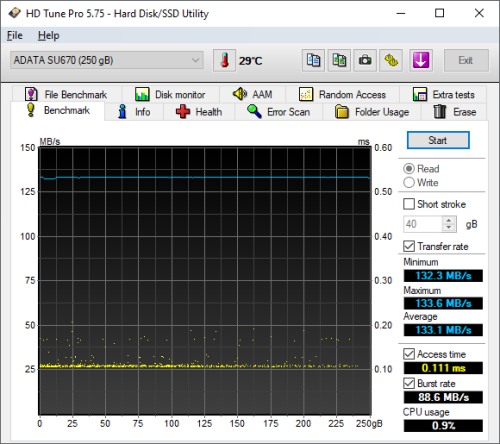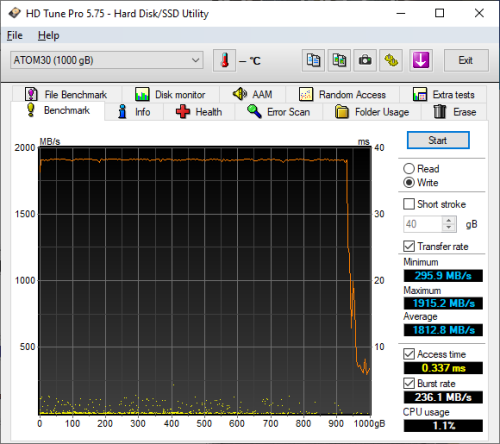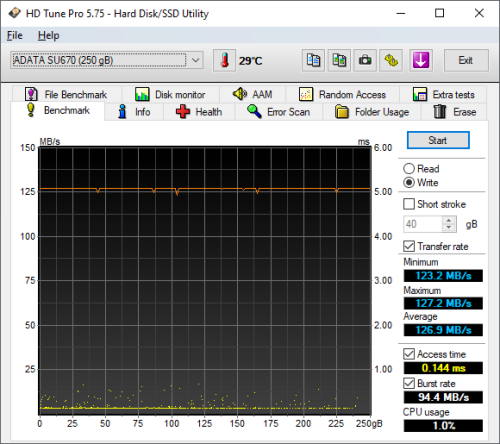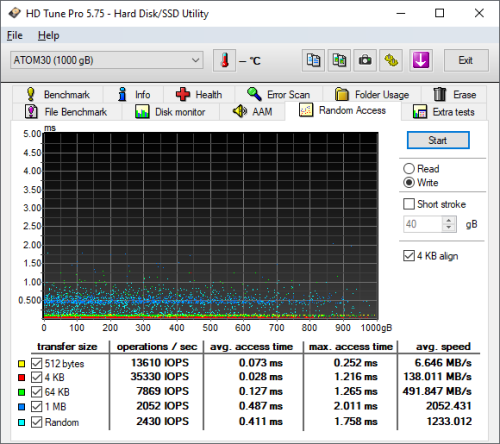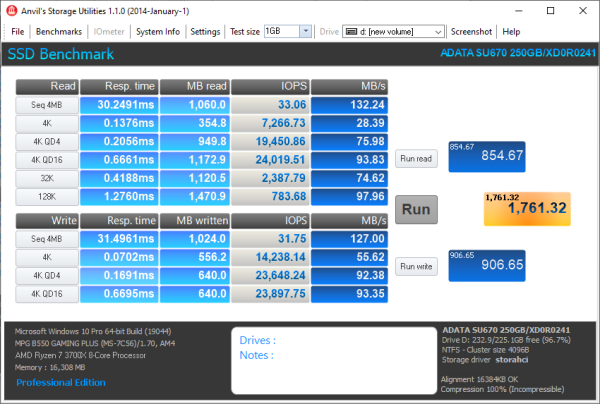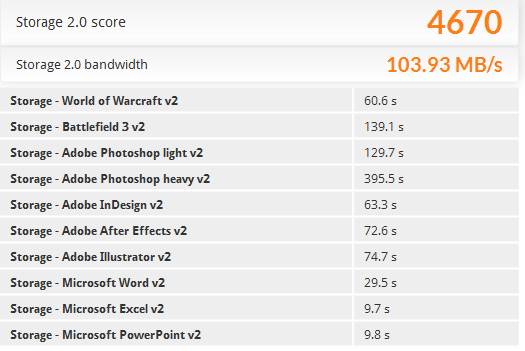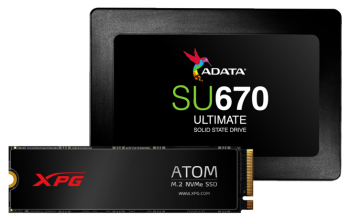

Model: ADATA XPG ATOM 30 1TB PCIe and 250GB SATA SSD Kit
Manufacturer: ADATA Technology
Provided By: ADATA Technology (USA)
ADATA Technology is one of the world's leading manufacturers of high performance memory modules and data storage solutions. Founded in 2001 with a staff of 20, this Taiwanese company set itself apart from the competition early on thanks to its professionalism, industry know-how and eye-catching product designs. Today, ADATA continues to lead the way through constant innovation and development of products that exceed customer expectations. Backed by technical expertise, state-of-the-art manufacturing facilities and premium customer service, ADATA currently offers a variety of products including DRAM modules, USB flash drives, memory cards, solid state drives and portable hard drives.
This past fall, ADATA launched its XPG ATOM series SSDs. In addition to the ATOM 40 and 50, the company unveiled a new affordable, entry-level PCIe 3.0 SSD, the ATOM 30. Designed for the creative professional on a budget, this M.2 form factor drive is powered by Realtek's RTS5766DL controller and is available with up to 1TB of 3D TLC NAND flash. The ATOM 30 also features SLC caching and HMB (Host Memory Buffer) to accelerate read and write performance as well as Low-Density Parity Check (LDPC) code technology and AES 256-bit encryption to ensure data security and integrity. To top it all off, the drive is equipped with a slim, aluminum heatsink as well as a PCIe Gen3 x4 NVMe 1.3 interface.
What makes the ATOM 30 stand out amongst the crowd, though, is that it can be bought by itself or as part of a kit. With the kit, you get the drive as well as a 250GB Ultimate SU670 SATA SSD that can be used to upgrade the storage in another computer. The SU670 is powered by Realtek's DRAM-less RTS5735DLQ controller and utilizes SLC caching to deliver up to 560 MB/s read and 525 MB/s write speeds. Also, like the ATOM 30, the drive uses Low-Density Parity Check (LDPC) code technology to ensure data integrity by detecting and fixing errors.
| ADATA XPG ATOM 30 1TB PCIe and 250GB SATA SSD Kit | |
| Capacity | ATOM 30 : 1TB SU670 : 250GB |
| Form Factor | 2.5" / M.2 2280 |
| NAND Flash | 3D TLC NAND |
| Controller | ATOM 30 : Realtek RTS5766DL SU670 : Realtek RTS5735DLQ |
| Dimensions (L x W x H) | ATOM 30 : 80 x 22 x 3.13mm / 3.15 x 0.87 x 0.12inch SU670 : 100.45 x 69.85 x 7mm / 3.95 x 2.75 x 0.27inch |
| Weight | ATOM 30 : 9g / 0.32oz SU670 : 47.5g / 1.6oz |
| Interface | ATOM 30 : PCIe Gen3 x4 SU670:2.5", SATA 6Gb/s (SATA III) |
| Sequential Read (Max) | ATOM 30 : Up to 2,500MB/s SU670 : Up to 520MB/s |
| Sequential Write (Max) | ATOM 30 : Up to 2,000MB/s SU670 : Up to 450MB/s |
| 4KB Random Read IOPS(Max) | ATOM 30 : Up to 180K SU670 : Up to 30K |
| 4KB Random Write IOPS(Max) | ATOM 30 : Up to 200K SU670 : Up to 65K |
| Operating temperature | 0°C - 70°C |
| Storage temperature | -40°C - 85°C |
| Terabytes Written (TBW) | ATOM 30 : 600TB SU670 : 50TB |
| Shock resistance | 1500G / 0.5ms |
| MTBF | 2,000,000 hours |
| Warranty | ATOM 30 : 5-year limited warranty SU670 : 3-year limited warranty |
Needless to say, this is only a taste of what the ATOM 30 has to offer. To give you an idea of what to expect, we'll take a closer look at ADATA's new PCIe 3.0 SSD as well as the SATA SSD included in the kit and see how well they perform. Does the ATOM 30 have what it takes? Can it deliver the value and performance we've come to expect from ADATA? Keep reading as we find out.
The ATOM 30 kit comes in a small black box. Along with a picture of the drives, the front advertises a number of their key features including their 1TB and 250GB capacities, PCIe Gen 3 and SATA 6Gb/s interfaces and maximum read speeds. The back of the box provides a bit more information regarding the drives' features and performance. Inside, you'll find the two SSDs as well as a black, aluminum heatsink that can be attached to the ATOM 30.

Physical Features:
The ATOM 30 uses the 2280 form factor for M.2 (NGFF) SSDs. It measures 80 x 22 x 3.3 mm and weighs in at 9g. The drive also has an "M key" edge connector which provides PCIe SSDs with up to 4x lanes of bandwidth.

The ATOM 30 uses Realtek's RTS5766DL controller. Not much is known about this PCIe Gen 3 x4 controller aside from it having four channels and being DRAM-less.


For the 1TB version of the ATOM 30, ADATA has opted to use its own Micron manufactured 3D TLC NAND flash. Looking at the picture above, you can see that there are four 256GB NAND flash packages on top of the PCB. There is also no DRAM cache chip as the ATOM 30's RTS5766DL controller takes full advantage of NVMe's Host Memory Buffer feature by using a small portion of the computer's memory to cache the mapping tables.

The aluminum heatsink included with the ATOM 30 is simple, yet functional. It attaches to the top of the drive using thermal adhesive and has a small, yet measurable, impact on temperature.
The Ultimate SU670 looks very similar to ADATA's other 2.5-inch SSDs. The outer casing is made entirely out of black plastic with stickers on the top and bottom showing information like the model name, number and warranty code.


The SU670 uses Realtek's RTS5735DLQ controller. Aside from the fact that it is DRAM-less, very little is known about this controller at this time.


For the 250GB version of the SU670, ADATA has opted to use its own 3D MLC NAND flash. Looking at the pictures above, you can see that there are two 128GB NAND flash packages on the back of the PCB. Also take note that there is no DRAM cache chip. Instead, there is small DRAM cache embedded in the controller.
The test system used in this review is equipped with an AMD Ryzen 5 3700x CPU, MSI B550 GAMING PLUS motherboard, 16GB (8GB x 2) of Crucial Ballistix 3200 MHz DDR4 memory, Crucial P5 1TB SSD and a GIGABYTE GeForce GTX 1060 WINDFORCE OC 6G graphics card. For the operating system, I used the latest version of Windows 10 Pro.
To test the performance of ADATA's XPG ATOM 30 SSD, I ran a series of benchmarks using CrystalDiskMark, HD Tach RW, ATTO Disk Benchmark, AS SSD, HD Tune Pro, Anvil's Storage Utilities, Iometer and PCMark. For comparison, I've also included test results from the ADATA XPG GAMMIX S70 Blade, Crucial P5 Plus, Plextor M10PY, ADATA XPG GAMMIX S70, Sabrent Rocket 4 Plus, WD_BLACK SN850, Silicon Power US70, ADATA XPG GAMMIX S50 Lite, Samsung 980, Silicon-Power UD70, Crucial P2, SK hynix Gold P31, Crucial P5, ADATA SWORDFISH, ADATA FALCON, Lexar NM610, Silicon Power P34A60, Patriot P300, Plextor M9PG Plus, Plextor M9PY Plus, ADATA XPG SX6000 Pro, Western Digital WD_BLACK SN750, Lexar NQ100, Samsung 970 EVO Plus, ADATA XPG SX8200 Pro, Crucial P1, ADATA XPG SX8200, Western Digital WD_BLACK NVMe, Samsung 970 EVO, Samsung 970 PRO, Plextor M9Pe, Plextor M8Se, Patriot Hellfire, ADATA XPG SX8000, Samsung 960 PRO, Toshiba OCZ RD400, Samsung 950 PRO, Samsung 870 EVO, Samsung 870 QVO, Silicon Power PC60 and SK hynix Gold S31.
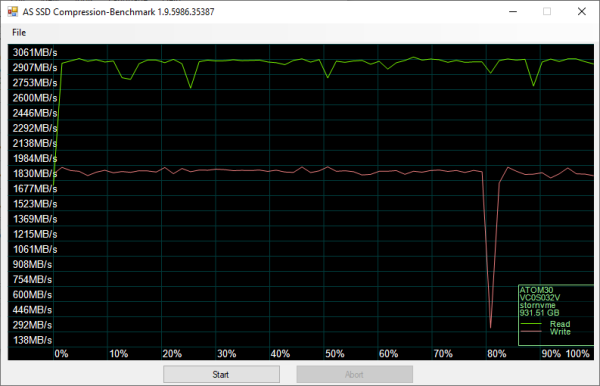
As I mentioned earlier, the ATOM 30 uses Realtek's RTS5766DL controller chip. Looking at the screenshot above, you can see that it performs equally well with both incompressible (0%) and compressible (100%) data.
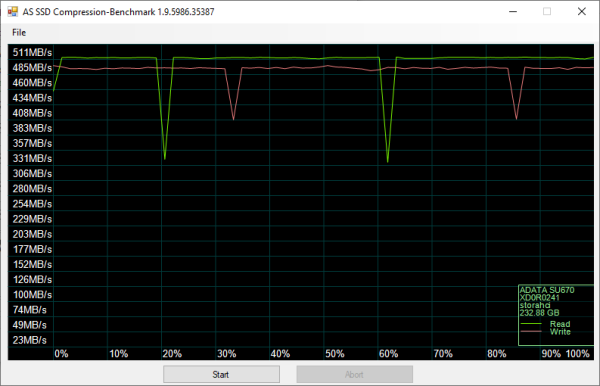
The Ultimate SU670 uses Realtek's RTS5735DLQ controller chip. Like the RTS5766DL, it performs equally well with both incompressible (0%) and compressible (100%) data.
CrystalDiskMark 8.0.4:
First, I ran a few quick tests using CrystalDiskMark. This benchmark measures the performance of a storage device by testing its sequential and random read and write speeds. For this test, we're using the peak and real world profiles.
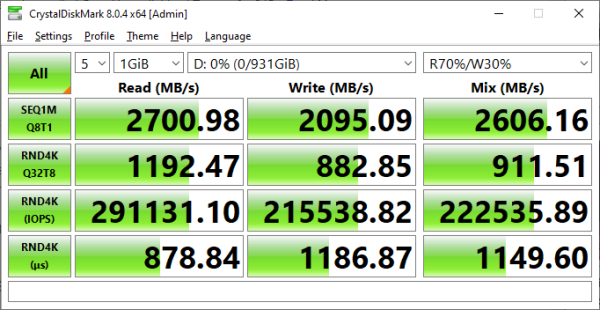
According to ADATA, the 1TB ATOM 30 is capable of reading at 2,500 MB/s and writing at 2,000 MB/s. As you can see, the drive had no problems reaching these speeds in CrystalDiskMark's sequential read and write tests.

As you'd expect, the Ultimate SU670 isn't nearly as fast as the ATOM 30. Nevertheless, it was still able to read at 546 MB/s and write at more than 516 MB/s.
HD Tach RW 3.0.4.0:
Next, I used HD Tach to test the ATOM 30 kit's read, write and burst speeds as well as its random access time and CPU usage.
Like most other TLC-based SSDs, the ATOM 30 and Ultimate SU670 use some sort of SLC caching. In the case of the ATOM 30, the drive starts writing at about 1,000 MB/s and then drops to about 250 MB/s when the write operation exceeds the size of the cache.
ATTO Disk Benchmark 4.01:
I also used ATTO Disk Benchmark to test the ATOM 30 kit's sequential read and write speeds. The tests are run using blocks ranging in size from 512B to 64 MB and the total length set to 256MB.
When tested with ATTO, the ATOM 30's read speeds topped out at about 2.52 GB/s and its write speeds at 1.94 GB/s.
AS SSD:
AS SSD is a benchmark designed specifically for solid state drives. The application contains five synthetic tests which are used to determine the sequential and random read and write performance of a drive.
AS SSD also includes a copy benchmark. This test copies an ISO (two large files), program (many small files) and game (small and large files), returning the speed and duration of each.
HD Tune Pro 5.75:
Next, I ran a series of tests using HD Tune Pro. This hard disk utility measures a drive's performance by testing its sequential read and write speeds as well as its access time, burst rate and CPU usage. For this review, I'm also going to use it to benchmark the ATOM 30 kit's random read and write speeds, random access times and the number of operations per second.
The ATOM 30 performed relatively well when benchmarked with HD Tune. The drive had average read and write speeds of 2,546.6 MB/s and 1,812.8 MB/s, respectively.
When reading 4KB blocks, the ATOM 30 reached 33,920 IOPS and had an average speed of 132.501 MB/s. The drive was even faster when writing, reaching 35,330 IOPS with an average speed of 138.011 MB/s.
Anvil's Storage Utilities:
Anvil's Storage Utilities is another benchmark designed with SSDs in mind. The standard storage benchmark measures a drive's performance by testing its transfer speeds, access times and IOPS.
Iometer:
Lastly, I ran a series of tests using Iometer. This tool can be configured to benchmark a number of things. In this case, I used it to measure the ATOM 30 kit's read and write speeds and the number of operations per second. The tests were run using random bytes and a queue depth of 3.
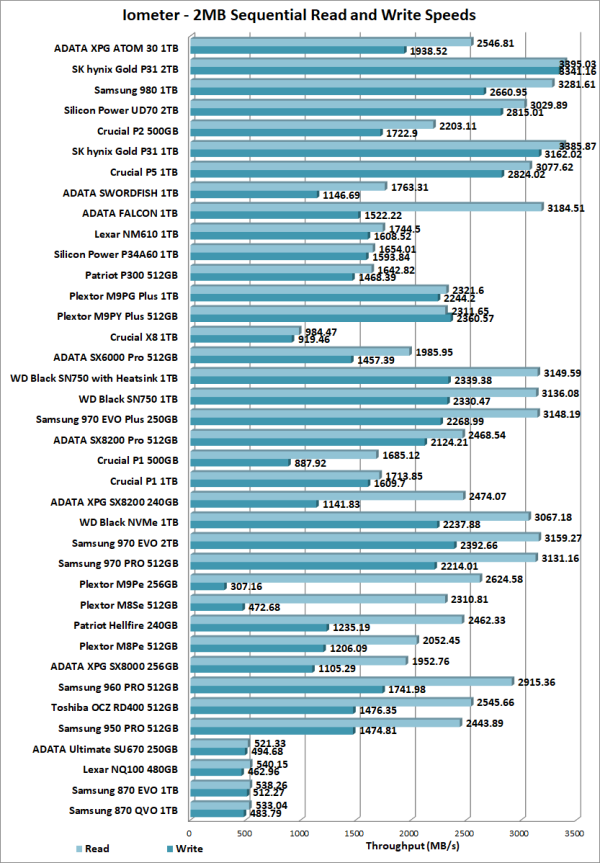
The ATOM 30's performance was very similar to what we saw in our other tests. The drive was able to read at 2546.81 MB/s and write at 1938.52 MB/s.

The ATOM 30 also performed fairly well when doing random reads and writes. In our tests, the drive was able to read at 312.33 MB/s and write at 536.31 MB/s.
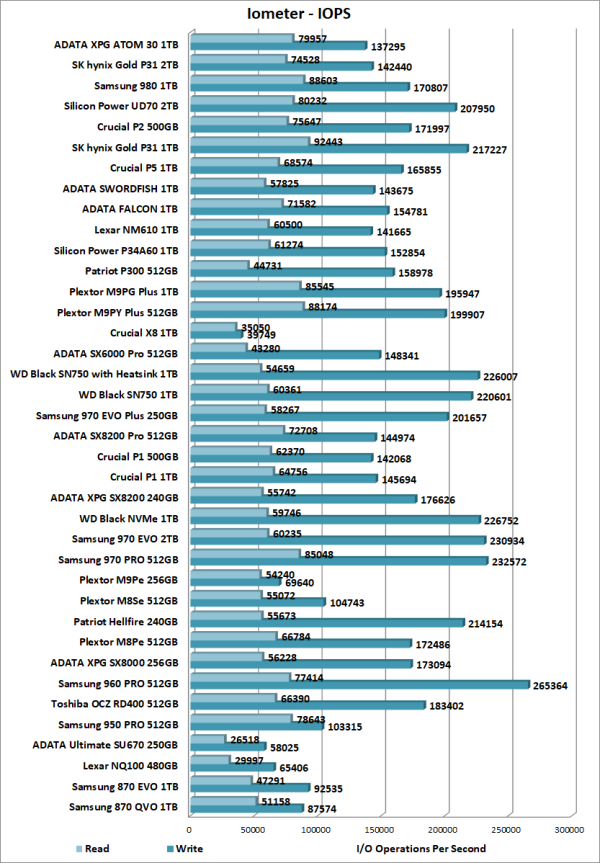
According to ADATA, the 1TB ATOM 30 is capable of 190,000 IOPS when reading and 200,000 IOPS when writing 4K blocks. With two threads and a queue depth of three, the drive reached 79,957 random read IOPS and 137,295 random write IOPS. As with most drives, the ATOM 30 performed better with more threads and at higher queue depths. With four threads and the queue depth set to 32, it reached 198,201 random read IOPS and 209,353 random write IOPS.
PCMark 8 - Storage Test:
PCMark 8 is a complete benchmark for Windows. It includes five benchmark tests, each designed around a specific scenario. The storage benchmark measures drive performance using real-world traces recorded from Adobe Creative Suite, Microsoft Office and a selection of popular games.
PCMark 10 - Full System Drive Benchmark:
PCMark 10's Full System Drive Benchmark uses a wide-ranging set of real-world traces from popular applications and common tasks to fully test the performance of the fastest modern drives. This benchmark produces an overall score as a measure of drive performance. Comparing devices is as simple as comparing scores. The tests also measure and report the bandwidth and average access time performance for the drive.

While not the fastest PCIe SSD to come through the 'Labs, the ADATA XPG ATOM 30 delivers a lot of bang for your buck. This heatsink-equipped, M.2 form factor SSD is powered by Realtek's RTS5766DL controller and is available with up to 1TB of 3D TLC NAND flash. Combine this with a PCIe Gen3 x4 NVMe 1.3 interface and you have a drive capable of delivering more than four times the performance of your average SATA SSD. In our sequential read and write tests, the 1TB version of the ATOM 30 was able to read at speeds as high as 2,700 MB/s and write at speeds in excess of 2,095 MB/s. It also did relatively well in our random write tests, producing more than 137,000 IOPS at low queue depths.
Of course, that's just the ATOM 30 by itself. If you spend an extra $30 and buy the kit, you also get a 250GB Ultimate SU670 SATA SSD. Powered by Realtek's RTS5735DLQ controller, the drive's performance is on par with other DRAM-less SATA SSDs. Like the ATOM 30, it also includes a number of features including SLC caching and Low-Density Parity Check (LDPC) code technology. Aside from it having only a three year warranty versus five like the ATOM 30, the only real complaint I have about the SU670 in the kit is its capacity. Instead of a 250GB drive, I would have liked to have seen one with 500GB or even 1TB of storage. This wouldn't have raised the price very much and the extra capacity would allow you to install more than an operating system and a couple of applications or games or let it be used in a game console like the PS4.
The XPG ATOM 30 is available by itself in 500GB and 1TB capacities and can be purchased from Amazon for $48 and $90, respectively. Otherwise, the ATOM 30 kit reviewed here can be picked up for as little as $100 (normally $120) when you clip the $20 off coupon.
Highs:
- Available by itself or in a kit with 250GB SATA SSD
- PCIe 3.0 x4 interface with NVMe protocol
- Realtek RTS5766DL controller
- Equipped with 3D TLC NAND
- Good sequential and random read and write speeds
- Small M.2 2280 form factor
- SLC caching
- Low-Density Parity Check (LDPC) code technology
- Host Memory Buffer (HMB)
- Aluminum alloy heatsink
- AES 256-bit encryption
- Works with ADATA's SSD Toolbox software
- Reasonably priced
- ATOM 30 has 5 year warranty
Lows:
- Write speed drops when SLC cache is full
- SU670 has only a 3 year warranty
- SU670 is only 250GB
